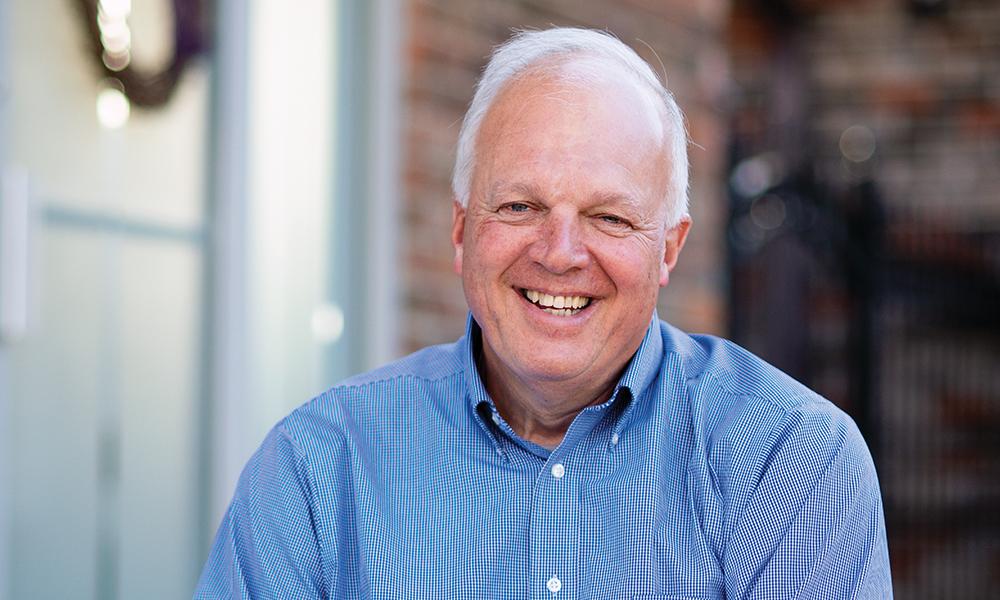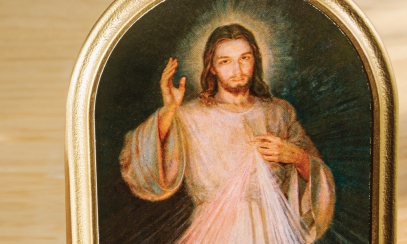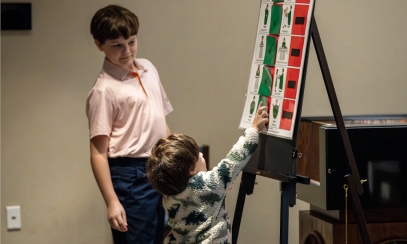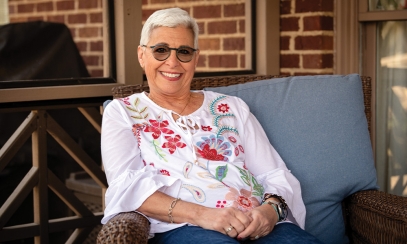
‘We can’t just throw them away’
Giving Dignity to the Incarcerated
Giving Dignity to the Incarcerated
“You’ve saved my life.” Deacon Lee Robinson was rather taken aback when he heard those words from a prison inmate early in his diaconate. At the time, he thought to himself, “I haven’t done anything,” but looking back over his two decades of prison ministry, he can now say with certainty that the inmate’s comment was a reaction to one thing: love.
“You’ve saved my life.” Deacon Lee Robinson was rather taken aback when he heard those words from a prison inmate early in his diaconate. At the time, he thought to himself, “I haven’t done anything,” but looking back over his two decades of prison ministry, he can now say with certainty that the inmate’s comment was a reaction to one thing: love.
The current form of prison ministry in the Diocese of Birmingham originated with Bishop David E. Foley. In January of 1997, the bishop announced the initiation of the first formation program for permanent deacons in over 15 years. With diaconal service consisting of three areas — Ministry of the Word, Ministry of Liturgy, and Ministry of Charity — Bishop Foley, on the advice of his priests, established four priorities for the Ministry of Charity: the Hispanic community, the incarcerated, the Black Catholic community, and the rural parts of the diocese.
Having been involved in lay ministry since 1993, when the announcement was made, Deacon Robinson, a cradle Catholic, began his diaconal formation. Through prayer, he discerned a calling to minister to the incarcerated. He admits, though, that he didn’t always feel that way. “I remember years ago, years before I started, there was a news article about putting color televisions in the prison system, and I thought, ‘Why would they do that? They don’t deserve it.’”
As a society, we segment people, especially those who have committed crimes. It can be so easy to just want to “throw them away.” “But it’s not all about their actions,” insists the deacon. “It’s not about whether they are supposed to be there or not. It’s about their humanity: they have souls. It’s not fighting to get them out or any of that. It’s about ministering to them and being Christ to them.” In essence, it goes back to love.
Many diocesan priests and deacons are presently committed to ministry inside Alabama’s prisons and jails because they are committed to this vital corporal act of mercy. “Prison Ministry,” says Deacon Tony Padron, “has been a blessing to me and has taught me much about the mercy of God. It is nothing more and nothing less than bringing love and compassion to those that are in great need of God’s mercy.” Deacon Walter Henderson attests, “They hear messages that they are not worthy and that they are scum of the earth. It means a lot to them that ‘free-world’ people give of their time.” For Deacon Henderson it is about “lifting people up” because “people can turn their lives to Christ if given the opportunity.”
Sadly, for those in prison, the opportunities aren’t as commonplace as one might imagine. Prisoners are only allowed to obtain two books a month, and visitors, including clergy, are not permitted to give anything to inmates. According to Deacon Adrian Straley, who ministered for more than 15 years at the Tuscaloosa County Metro Jail, some jails don’t even have a chapel for prisoners of different faiths to assemble. “Ministry in that jail was radically different from any prison I ever attended. … The volunteer ministers simply picked a ‘pod’ of eight cells sharing a common sitting room, entered it, and were locked in for about 50 minutes to conduct a Bible study.” For Deacon Straley, it didn’t help that he “was the only Catholic amidst a great throng of mainly evangelical Protestants.” The prominent non-Catholic presence is an actuality noticed by the inmates, especially the Catholic prisoners.
Early in Deacon Robinson’s ministry, he was going once a month to St. Clair Correctional Facility in Springville when he met Henry, an elderly inmate. Henry was a Catholic hungry for his Faith. “You need to get into the dorms and have a class,” he pleaded. “There’s nobody inviting Catholics. Who’s going to represent the Catholic side of things?”
Thanks to Henry, Deacon Robinson started having a faith and morals class every week. He even enlisted the help of his pastor, Father Bill Lucas of Our Lady of the Lake Catholic Church in Pell City. “When I began going to the prison,” says Father Lucas, “it was more because Deacon Lee kept bugging me about it. Once I started going, I could see how much a priest was needed there. The inmates are hungry for the sacraments, especially penance and the Eucharist. In The Joy of the Gospel, Pope Francis instructs the Church to bring the Gospel to the fringes. Prisons are definitely on the fringes of our society. And, it’s not just the inmates. The corrections officers and the staff need the Gospel, too.”
Although the five state prisons within the diocesan boundaries have a Catholic population that mimics the three percent of Catholics in the diocese as a whole, the deacon holds firm in his belief that “somebody has to feed them.” Obviously, there is an instructional or theological side of what Deacon Robinson and others offer the inmates, but, more importantly, it is their presence which fosters an openness, enabling the inmates to be guided by the Holy Spirit. Currently, 12 men come to the deacon’s weekly classes, and two aren’t even Catholic.
The deacon feels that the Holy Spirit also bestows a grace to minister without judgment. He views the inmates as friends, employing his mantra, “There, but for the grace of God, go I.” He is able to acknowledge that his life may have been similar to that of the inmates had he “just turned a little different.” Through humility, Deacon is able to recognize the prisoners’ inherent dignity as children of God.
“There’s good people inside the prison and there’s bad,” affirms Deacon Robinson, “ just like out in the free world. The first thing is that they need to be seen just as we see other people that we meet. We don’t go through the cashier line and judge the cashier. We don’t know what’s inside someone, and we don’t know their past or their history. … [Inmates are] just as deserving of help, love, and Christ.”
The reality of the crimes committed, however, is not lost on the deacon. “They’re in there, rightly convicted,” he concedes. “They’re in there because that’s the law, and that’s where they need to be to protect society. But, it’s not about locking somebody up, it’s about rehabilitating someone. Just like in AA, if you don’t find God, you don’t rehabilitate.”
In all honesty, everyone is in need of some type of rehabilitation: mental, physical, spiritual. No matter the barrier, only God can truly set us free. As disciples of Christ, our mission is to love each other, especially those on the fringes, by imitating Him. A person’s mistakes cannot negate their worth. “We can’t just throw them away,” explains Deacon. “We take away our dignity if we take away theirs.”
A layman’s perspective:
“I have seen the yearning of the inmates to get back with God. You don’t realize what you have until it is taken away. We can attend Mass most any day or time, but they are at the mercy of those outside the system that can volunteer to come to them. I am thankful to God that He has put them in my life, to teach me.”
— Sammy Schillaci, minister at Federal Correctional Institution Talladega
A layman’s perspective
“As a layperson, I wish there were more people willing to get out of their comfort zone and get into this ministry. This is a very rewarding ministry. We serve a population that truly appreciates us coming to see them and bringing Jesus to them, both in word and in the Eucharist. The sad thing about our ministry is that we are limited … on the number of people we can reach. … We can’t rely on our ordained clergy to do everything, especially here in Alabama where they are stretched thin. It’s up to laypeople to pick up the slack.
“I personally have a unique perspective on prison ministry. I used to be in law enforcement. … I was an MP in the Army for 22 years. I was married with two kids and was going to Mass every Sunday. Both of my girls went through CCD and were confirmed. All was good in the world.
“Then my world began to fall apart, piece by piece — divorce, remarriage, retirement from the Army, and another divorce. I felt like I had lost all the anchors of my life. ... I didn’t feel that the Church was there for me anymore. I was too big of a sinner. I had a breakdown and did something really stupid and terrible that put me in prison for five years in Virginia, but God stepped in the year before I was arrested.
“While searching for answers in every church and from every televangelist that I could find on TV, I stumbled on a program with this old Catholic nun (Mother Angelica). What she was saying spoke to my soul, so I went to confession for the first time in years. … I became very involved in an Air Force chapel in Guam, assisting at Mass, singing in the choir, and teaching the confirmation class. But, at the end of that year, I had to pay the price and was arrested.
“During my time of incarceration, I was moved from jail to jail and then prison to prison — seven times over a five-year period. At the jails, I managed to get a call to the local parish. Eventually, I would get a priest or deacon to come in to minister to the handful of Catholics that were locked up with me. It was normally only a Communion service. The prisons were another story. The first two places had biweekly Mass that, many times, got canceled due to ‘security concerns.’ Strangely, the other evangelical church services never got canceled. The last place had no outside Catholic contact. I was leading Bible/catechism classes in our dorm, usually at the side of my bunk. One day, I got my hands on the newspaper for the Diocese of Richmond and decided to write a letter to the editor to explain what it was like to live without the Church in prison.
“Two weeks later, we were called out to go for Catholic Church services. Surprise! The bishop was there with a young priest in tow, and he said that he was assigning this priest to take care of us from here on out. I still have the copy of the newspaper with my letter to the editor stored in a plastic bag. Reading it now, I see how not much has changed in the 20 years since I wrote that letter. I’ve come full circle, and I will never forget how I felt back then. I have truly walked a mile in the shoes of inmates. Prison Ministry is a very fulfilling way of getting out of the comfort zone of the pew and practicing the faith through action. Jesus gave us the Holy Spirit so we could be His hands and feet and mouth to spread His Gospel. We can’t do it sitting in the pew. He said to go out into the world. He didn’t say to sit in your safe space.
— Ernie Thurston, minister at St. Clair Correctional Facility
The Office of Evangelization is planning an informational meeting on the Prison Ministry in the fall, dates and times to be announced. To learn more about the Prison Ministry and how you can help, please contact John Martignoni at jmartignoni@bhmdiocese.org.



